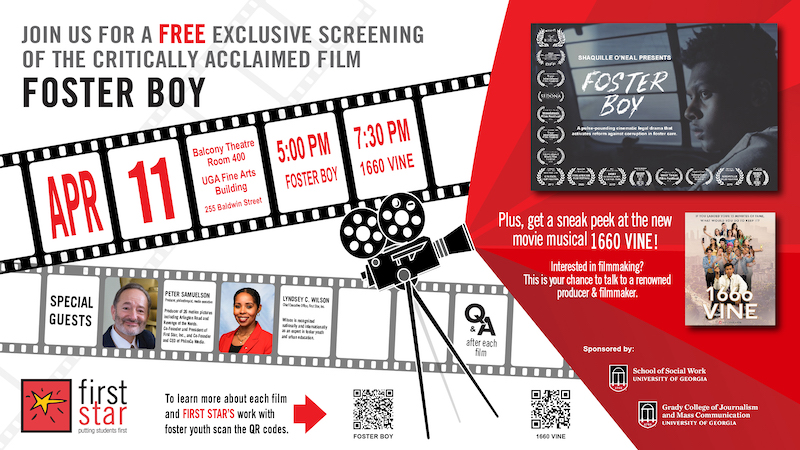By Thomas Ehlers
The University of Georgia School of Social Work will host a free screening of the critically-acclaimed film Foster Boy on April 11.
Sponsored in conjunction with Grady College, the School of Social Work will screen Foster Boy at 5:00 p.m. followed by a question-and-answer session with producer and philanthropist Peter Samuelson and Lyndsey Wilson, CEO of First Star Inc, a non-profit that builds strong pathways for high school-aged youth in foster care.
Additionally, a special preview of the musical 1660 Vine will begin at 7:30 p.m., following the session with Samuelson and Wilson.
The event is free and will take place in the Terrace Theatre of the UGA Fine Arts Building at 255 Baldwin Street.
Samuelson, producer of 27 motion pictures including Foster Boy and co-founder of First Star Inc., has dedicated much of his life to philanthropy and advancing social causes. He has founded or co-founded seven different non-profits, each centered around different social challenges including homelessness, foster care, and child and family health.
Through Foster Boy, he was able to address the concerns around for-profit foster care facilities with his expertise in filmmaking.
“My life is blessed, certainly with these two films, being able to do both things at one time,” Samuelson said. “The whole of my career, 27 films, I’ve either been making films or – entirely unrelated – dreaming up another charity, raising the money, hiring the people, making it bigger. What I hadn’t done until Foster Boy was both things in one activity.”
Foster Boy follows a trial between a for-profit foster care agency – accused of putting a known sex offender into the same foster home as a boy, Jamal – and Jamal’s legal team. Jamal’s lawyer, Michael, wants nothing to do with the case at first, but his work reveals the horrifying depth of the corrupt and abusive for-profit foster care agency. He is transformed from cynical skeptic to fierce warrior in the pursuit of justice through the trial.
The second film, 1660 Vine, explores the journey of a social media influencer, taking a dive into the artificial identity built to please brands and followers that ultimately widened the gap between true and online self. It follows an ensemble of artists, bloggers, pranksters, gamers and other members of the collective that found community in the luxury Hollywood apartment building of 1660 Vine Street.
The event is geared to students in the School of Social Work and Grady College of Journalism and Mass Communication, and the session with Samuelson and Wilson will touch on social work ideas as well as the cinematographic and audio-visual aspects of the films. Samuelson hopes the screening will guide students to invest in bettering their communities as they begin their careers.
“One way or another, this is precisely the age demographic that hasn’t completely decided on their professional direction,” Samuelson said. “There are two ways of making social work a part your career. One way is you can do it as your career – you can train to be a social worker in the School of Social Work … the other way is you can go off in a career, anything from a lawyer to a CPA to an architect, but you can have determination that you will on a regular basis exert yourself to make the world a better place.”
“Unfortunately, the world is broken in so many ways. There are so many (problems) that a young person should say, ‘Here is my skill set. I, personally am going to do something about this.”

